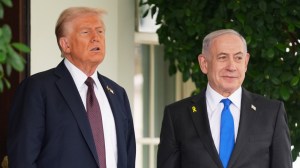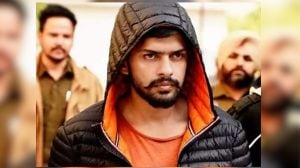Humble farmer on a Hegde trail
Either Presidentship or Prime Ministership. Till the other day, that was the demand of T.N. Seshan alone. Now, it is Deve Gowda's as well. ...

Either Presidentship or Prime Ministership. Till the other day, that was the demand of T.N. Seshan alone. Now, it is Deve Gowda’s as well. While Karnataka Chief minister J.H. Patel and his Cabinet proposed him as the presidential candidate of the Janata Dal, the former Prime Minister has roared a pledge at public rallies in Karnataka to return to "the centrestage".
The sudden outburst after so long a silence is rather reminiscent of his tirade against the Congress in Parliament after ten months of uncomplaining accommodation to the outside supporter of his government. Pent-up emotions and their periodic expressions, which startle in the manner of expletives from a prude, may well have become his way of political life. The time he has chosen to set out on a comeback trail, however, may not surprise many. The problems of the Janata Dal leadership, particularly of Laloo Prasad Yadav, can be presumed to have prompted the move, with an additional provocation being provided by the cutting of loyal lieutenant and Civil Aviation Minister C. M. Ibrahim to size in the latest reshuffle of I.K. Gujral’s pack.
Predictable, too, is the platform adopted by Gowda for the campaign. It was as a humble farmer that he staked a claim successfully to Prime Ministership the first time; it was in the same capacity that he sought to stay on in power; and he is back to the same theme as the rationale for his return.
He is not the first to do so. Peasant power is what the weaker claimants among wannabe Prime Ministers have, again and again, presented as their cause and constituency. They have sought to project themselves as the representatives of the `real’ India that is rural or of an indigenous Bharat that `India’ has held at bay. The logic of the line has been clear: it promises the backing of the land’s majority and is thus bound to lead to power. Somehow, alas, it has never worked quite that way. Villages have never encircled cities in the wars of votes, and democracy has not once been really translated into the dreamed-of rule of the occupational majority. The tactic, however, has continued to be tried.
Chaudhary Charan Singh did it, though without his sincerity being seriously challenged. While his commitment to the kisan cause was acknowledged, however, even villagers would not buy his idea of a soap as an obnoxious urban luxury calling for a penal levy. Tau Devi Lal did it, but only to make himself thereby an object of wider derision than before. The rustic idiom of his electoral rhetoric against Rajiv Gandhi paid political dividends, but the buffaloes he symbolically tended in the Deputy Prime Minister’s bungalow did not significantly advance his career.
Gowda has done it before without greater success. And he is doing so again with a far from fully credible claim to speak for the "60 crore farmers of India". He enjoyed a spell of strong credibility as a spokesman of the farmers of his own state, of course. But, that was during the Cauvery crisis, when he hardly appeared a kisan partisan to the Tamil Nadu peasantry, particularly the tillers of Thanjavur. The riparian dispute, meanwhile, did nothing to convince Karnataka farmers’ leader Nanjundappa of the anti-KFC agitation fame that Gowda was their friend.
The former Prime Minister has now gone ahead to identify an issue on which he hopes to pit the farmers of the country against a possible initiative by the Gujral government in further implementation of the liberalisation policy. The threat he has thunderingly delivered against any move to cut the agricultural subsidies may not really deserve to be taken seriously. The question, however, is whether the political will, which successive governments have refused to summon in this regard, is going to be forthcoming — only because Gowda is not a dreaded force, and remains a provincial politician notwithstanding the national concerns displayed off and on.
Of no one is Gowda today more reminiscent than of another former national leader from Karnataka who is ironically his main rival in the state. Ramakrishna Hegde, too, continued to affect larger concerns after losing his place in top echelons of the Janata parivar. It was not long, however, before he reverted to the regional role of his real interest and he has now let himself be reduced to the status of a subregional symbol as the `neta’ of a north Karnataka party. It will be hardly surprising if Gowda’s `comeback’ ends up, similarly, in his going back.





- 011 day ago
- 021 day ago
- 031 day ago
- 041 day ago
- 051 day ago


























